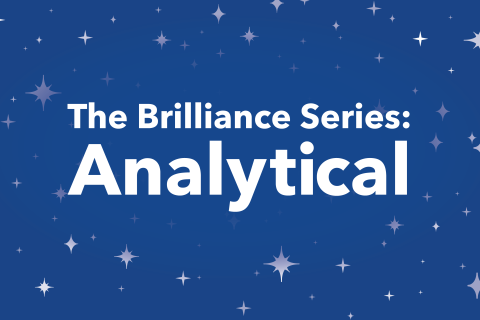
The Brilliance Series invites you to take a closer look at each of the seven Emergenetics® Attributes. Whether you are craving more information about your own Profile or interested in better understanding the preferences of others, these blogs will offer insights to shine a light on the gifts of each Attribute. This week, we’re exploring Analytical.
An Overview
Analytical Thinking is typically marked by an interest in logic and rationale. The Attribute is often recognized for a rigorous approach and may be naturally skeptical. A person with this preference often seeks evidence, verification and data to support its own thinking as well as evaluate the thinking of others. While studies and statistics are appreciated, not all sources are equal as credibility is essential.
When the Analytical mind is intrigued or if doubt has crept in, it investigates thoroughly and perseveres until all questions are answered. Typically, from the perspective of Analytical thought, the greater the complexity of the task or problem to solve, the higher the reward.
Some of the terms commonly associated with Analytical include:
- Logical
- Objective
- Data-driven
- Disciplined
- Efficient
- Bottom-line oriented
The Inner Monologue
To examine the Analytical Attribute in greater depth, watch this short video where I share some insights into its burning question – why – and what may be going on in the mind of someone who has this preference.
The Brilliances
While there are many gifts common to Analytical Thinking, I’ve provided a bulleted list below to speak to this Attribute’s desire for high-level information. Some of the brilliances of the Analytical mind include its propensity to:
- Ask discerning questions
- Be quick to spot inconsistencies and faulty logic
- Provide a systematic approach to problem solving
- Seek out value and efficiency
- Apply a rational, logical methodology
- Call on data and research
- Get to the point
Motivation
Having a foundational understanding of the gifts and interests of Analytical Thinking enables us to create an environment where the Attribute feels engaged, curious and valued.
If Analytical is one of your preferences, I invite you to examine the opportunities to introduce more of the elements below into your activities to stimulate your own motivation. If you are connecting with someone who is an Analytical thinker, identify ways to factor these considerations into your approach.
- Tie topics to a relevant why
- Engage in exploration of thought and questions
- Introduce opportunities for problem solving or system design
- Take part in research and analysis
- Develop expertise in the subject matter
- Uncover the value and bottom-line impact
- Make connections to current trends
Flexing Into Analytical
In addition to motivation considerations, individuals who do not have a preference in Analytical Thinking can learn to flex to better support their coworkers, friends or family members who have a preference in this Attribute by:
- Providing a high-level overview (and coming prepared with the details of how you got there, if asked)
- Offering statistics, facts and data to explain your point of view
- Speaking precisely and accurately
- Making logical connections to the importance of information
- Acknowledging their counterpart’s experience and expertise
- Making time for and appreciating questions
- Communicating value and the return on their investment
Remember that even if you do not prefer Analytical Thinking, the Attribute is still part of your Emergenetics Profile. It may take concerted effort, and you are capable of embracing this perspective. By flexing your Analytical skills and demonstrating that you value its interests, you will create space for individuals with this preference to thrive as well as benefit from the power of cognitive diversity.
Explore the other entries in our series: Structural, Social, Conceptual, Expressiveness, Assertiveness and Flexibility.
Learn how your team can flex to support all Profile types. Explore the courses in The egLearning Library or fill out the form below to talk to one our staff members about potential training solutions!
 Print This Post
Print This Post
